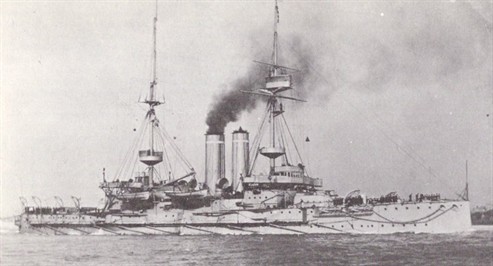13 May 1915
HELLES - Midshipman Wolstan Weld-Forester, HMS Goliath, Royal Navy - "Inside the ship everything which was not secured was sliding about and bringing up against the bulkheads with a series of crashes. She had heeled over to about twenty degrees, then she stopped and remained steady for a few seconds. In the momentary lull the voice of one of our officers rang out steady and clear as at divisions: "Keep calm, men! Be British!"
 Even at sea the Allies were beginning to suffer as the great pre-dreadnoughts sat, off shore, like enormous tethered goats. They were an obvious target but until the German U-Boats arrived they seemed safe enough. Or at least they did until a Turkish torpedo boat, the Muavenet-i Milliye, crept out and launched an audacious attack on the Goliath which was on duty guarding the right flank of the French just inside the Straits in Morto Bay. Youthful Midshipman Wolstan Weld-Forester remembered what happened when the torpedoes hit at 01.17 on 13 May.
Even at sea the Allies were beginning to suffer as the great pre-dreadnoughts sat, off shore, like enormous tethered goats. They were an obvious target but until the German U-Boats arrived they seemed safe enough. Or at least they did until a Turkish torpedo boat, the Muavenet-i Milliye, crept out and launched an audacious attack on the Goliath which was on duty guarding the right flank of the French just inside the Straits in Morto Bay. Youthful Midshipman Wolstan Weld-Forester remembered what happened when the torpedoes hit at 01.17 on 13 May.
"CRASH! Bang! Cr-r-r-ash! I woke with a start and sitting up in my hammock gazed around to see what had so suddenly roused me. Some of the midshipmen were already standing on the deck in their pyjamas - others, like me, were sitting up half dazed with sleep. A party of ship's boys crowded up the ladder from the gun-room flat, followed by three officers; one of these, a Sub-Lieutenant called out: "Keep calm and you'll all be saved!" Up to that moment it had never dawned upon me that the ship was sinking, and even then I thought it improbable until I noticed that we were already listing to starboard."
Weld-Forester made his way up onto the quarterdeck. Soon there was no denying what was happening to the Goliath.
"The ship was now heeling about 5 degrees to starboard and I climbed up to the port side. It was nearly pitch-dark. A seaman rushing to help lower the boats charged into me and I turned and swore at him. Gradually a crowd gathered along the port side, "Boat ahoy! Boat ahoy!" they yelled; but, as the ship listed more and more, and there was no sign or sound of any approaching vessel, the men's voices seemed to get a bit hopeless. Inside the ship everything which was not secured was sliding about and bringing up against the bulkheads with a series of crashes. She had heeled over to about twenty degrees, then she stopped and remained steady for a few seconds. In the momentary lull the voice of one of our officers rang out steady and clear as at divisions: "Keep calm, men! Be British!"
Then the ship heeled rapidly and, realising she was going down, Weld-Forester decided he had to jump for it if he was not to be caught up in the ferocious undertow that would be generated when the ship sank.
"Raising my arms above my head I sprang well out board and dived. Just before I struck the water my face hit the side of the ship. It was a horrid feeling sliding on my face down the slimy side, and a second later I splashed in with tremendous force, having dived about 30 feet. Just as I was rising to the surface again a heavy body came down on top of me. I fought clear and rose rather breathless and bruised. I swam about 50 yards away, to get clear of the suction when the ship went down. Then, turning round and treading water, I watched her last moments. The noise of crashing furniture and smashing crockery was continuous. Slowly her stern lifted until it was dimly outlined against the deep midnight sky. Slowly her bows slid further and further under until, with a final lurch, she turned completely over and disappeared bottom upwards in a mass of bubbles. She had been our home for nearly 10 months - she was gone - vanished - in less than 4 minutes."
After a terrifying battle with the currents that raced through the Straits he was eventually picked up by a naval cutter and taken aboard the Lord Nelson. Three of his fellow young midshipmen had been lost.
"SOURCE:
W. B. C. Weld-Forester, From Dartmouth to the Dardanelles (London: William Heinemann, 1916), p.152-155
